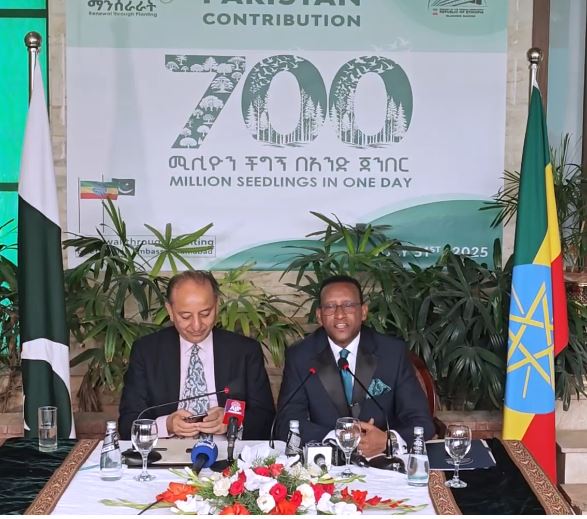 https://twitter.com/home https://www.facebook.com/Shabbir.Hussain191
https://twitter.com/home https://www.facebook.com/Shabbir.Hussain191By Shabbir Hussain
ISLAMABAD, July 31(Alliance News): In a powerful gesture of international solidarity and climate commitment, Pakistan has officially joined Ethiopia in its historic “700 Million Tree Planting in One Day” initiative, a part of the ambitious Green Legacy Initiative spearheaded by Ethiopian Prime Minister Dr. Abiy Ahmed.
The campaign, titled “Renewal Through Planting,” aims to mobilize nations toward collective environmental action and serves as a remarkable example of South-South cooperation for sustainable development and climate resilience.
To mark this significant collaboration, the Ethiopian Embassy in Islamabad hosted a high-profile joint plantation drive and media briefing, which brought together an impressive mix of stakeholders.


The event witnessed participation from diplomats, senior government officials, parliamentarians, youth leaders, civil society members, business representatives, religious scholars, and members of the press.
The gathering was not only a ceremonial affair but also a profound statement on the urgency of climate action in the face of accelerating environmental degradation, deforestation, and global warming.
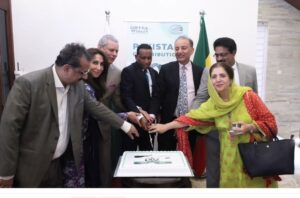
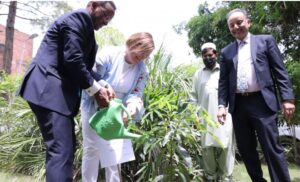
Federal Minister for Climate Change and Environmental Coordination Dr. Musadik Malik attended the event as the chief guest, while Hamid Asghar Khan, Additional Secretary (Africa) at Pakistan’s Ministry of Foreign Affairs, graced the occasion as the guest of honor.
Their presence underscored Pakistan’s commitment to forging meaningful partnerships with African nations, especially in areas of mutual concern like climate change and environmental sustainability.
Addressing the attendees, Ambassador of Ethiopia to Pakistan, Dr. Jemal Beker, delivered an inspiring speech in which he elaborated on the objectives and achievements of the Green Legacy Initiative.
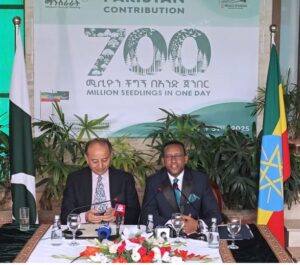
It was launched in 2019 by Prime Minister Dr. Abiy Ahmed, the initiative aims to restore Ethiopia’s degraded landscapes, combat climate change, and ensure food security by planting billions of trees.
Since its inception, the Green Legacy has planted over 32 billion seedlings across Ethiopia, with this year’s goal set at 7.5 billion, including the monumental 700 million trees planted in a single day.
Ambassador Beker described the initiative as a grassroots-driven national movement that has not only mobilized Ethiopians from all walks of life but is now inspiring global participation.
He expressed his profound gratitude to the government and people of Pakistan for joining the campaign and for standing in solidarity with Ethiopia’s climate vision.
“Today, as Pakistan joins Ethiopia in the Renewal Through Planting campaign, we send a strong and unified message to the world — that developing countries are not only victims of climate change but also leaders in climate action,” he said.
The Ambassador further announced that a high-level delegation from Ethiopia, comprising senior officials, climate scientists, and environmental activists, will soon visit Pakistan to participate in “Green Dialogues” and joint plantation campaigns across the country.
These dialogues are expected to foster knowledge exchange, strengthen bilateral relations, and explore collaborative frameworks to tackle climate challenges together.
In his keynote address, Federal Minister Dr. Musadik Malik praised Ethiopia’s visionary leadership and its ambitious approach to ecological restoration.
He noted that the Green Legacy Initiative offers valuable lessons for countries like Pakistan, which face similar environmental challenges, including water scarcity, desertification, and climate-induced disasters.
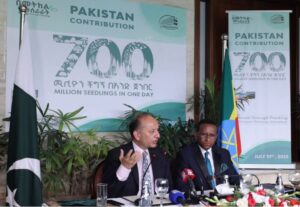
“Ethiopia’s example shows us that with commitment, coordination, and community involvement, it is possible to reverse the course of environmental decline,” said Dr. Malik.
He also acknowledged the Ethiopian Prime Minister’s remarkable efforts, calling Dr. Abiy Ahmed “a climate champion for the Global South.”
The Minister emphasized the need for continued South-South cooperation and regional solidarity to address the existential threat of climate change, particularly for developing countries that contribute the least to global emissions but bear the brunt of their consequences.
Dr. Malik also lauded Ambassador Beker for his tireless efforts in promoting green values and building strong people-to-people and government-to-government relationships between Ethiopia and Pakistan.
“The Ethiopian Embassy under your leadership has become a symbol of green diplomacy and climate consciousness,” he remarked.
The event concluded with a symbolic plantation ceremony, where trees were planted by dignitaries and participants as a gesture of unity and commitment. This act, though symbolic, served as a reminder of the collective power of small actions when taken together.


It reinforced the shared understanding that combating climate change requires both local and global efforts, and that meaningful collaboration can yield transformative outcomes.
The Green Legacy Initiative has garnered international attention for its scale and impact. Ethiopia’s massive reforestation effort is not merely an environmental campaign but a cornerstone of its national development strategy.
It seeks to enhance biodiversity, improve agricultural productivity, create green jobs, and foster a culture of environmental stewardship among its citizens.
For Pakistan, the partnership with Ethiopia arrives at a crucial moment. The country has experienced record-breaking heatwaves, floods, and droughts in recent years, with the 2022 floods alone displacing millions and causing economic losses estimated at over $30 billion.
Pakistan’s own Billion Tree Tsunami and Ten Billion Tree Tsunami projects have received international recognition, but the scale of the climate crisis demands even more ambitious, coordinated efforts.
This collaboration with Ethiopia represents more than a diplomatic gesture — it is a strategic alignment of values, goals, and actions in the realm of climate diplomacy.
It symbolizes a growing realization among developing nations that climate justice, adaptation, and resilience must be pursued collectively.
The shared commitment to reforestation and ecological restoration is a positive signal to the world that the Global South is capable of leading the fight against climate change from the front.
Furthermore, the joint initiative also opens avenues for future cooperation in areas such as climate-smart agriculture, renewable energy, environmental education, and research. By working together and sharing best practices, Pakistan and Ethiopia can contribute meaningfully to the global climate agenda, while strengthening their bilateral relationship in the process.
The participation of youth, civil society, and religious leaders in the plantation event also reflects a growing movement within both nations to embed climate awareness into every aspect of public life.

Such inclusive engagement ensures that the green message reaches communities across different regions and backgrounds, thereby increasing the chances of long-term behavioral change.
As the sun set over Islamabad, the green saplings planted at the Ethiopian Embassy stood as living symbols of hope, resilience, and cooperation.
In an era marked by environmental degradation and global uncertainty, the seeds of solidarity sown between Pakistan and Ethiopia may one day blossom into a greener, more sustainable future for both nations — and for the world.

